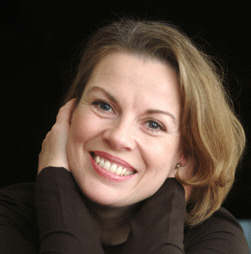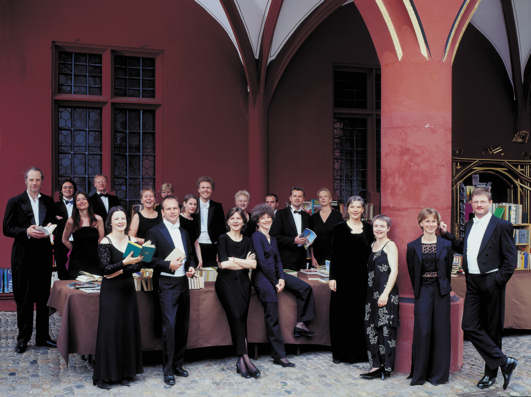Other Links
Editorial Board
- Editor - Bill Kenny
- London Editor-Melanie Eskenazi
- Founder - Len Mullenger
Google Site Search
SEEN
AND HEARD CONCERT REVIEW
Bach:
Bernarda Fink
(mezzo-soprano), Freiburg Baroque Orchestra, Barbican Hall, London
5.4.2008 (AO)
The very first time I heard Bernarda Fink was more fifteen years
ago, in the St Matthew Passion. Although she was already well
established by then, I’d not heard her in person. She looked so
tiny on the platform, then suddenly emitted a huge voice, filled
with power and beauty. She’s now one of the biggest names
around, but her Bach still holds a special place in my heart. So
when she sings with the Freiburg Baroque Orchestra, it‘s an event
not to be missed.
The spotlight falls on the flautist in Orchestral Suite No 2 in
B minor. It’s a difficult piece demanding great flexibility
and
I liked the delicacy with which Karl Kaiser played, making the
dance sections move with elegant restraint. A friend, whose
opinion I value highly, would have preferred him to be more
forward, as is usually the case in less HIP performances. But we
both enjoyed the Freiburger’s “collegiate” style, which captures
in so many ways the balance and proportion which expresses the
baroque ethos. And it was good to hear the famous Badinerie
played with such gentle good humour.

Bernada Fink
The Freiburg Baroque Orchestra’s Bach is special, too. It is one
of the great period ensembles, known for its spirited style.
Once, Bach’s music was new music and the Freiburgers approach it with
such vivacity that it sounds as fresh and as if it were still newly
discovered. They don’t believe that music belongs in a museum,
fossilised, the life squeezed out of it. Their enthusiasm is
infectious: if only more musicians played with such obvious
enjoyment! They have worked with Bernarda Fink many times over the
years, thus the comfortable convergence of style.

The Freiburg Baroque Orchestra - Picture © Peter Witt
The Sinfonia from the cantata Non sa che sia dolore
BVW 209 also makes a prominent feature of the flute. This time
the mood was more wistful, like a private conversation. The
dialogue between Kaiser and Anna Katharina Schreiber, the violin
soloist, was close in the way that musicians who play together
frequently can be. They listened attentively, feeding back their
appreciation to each other. Because they stand up while playing,
an element of body language comes into play, which further
enhances the sense of intimacy.
Schreiber then continued to dialogue with Katharina Arfken, the
oboist who had been so impressive in the opening cantata. The
Concerto for Violin and Oboe in D Minor BVW 1060 is a
reconstruction of fragments from a larger original, now lost. At
first the solo parts weave around each other, in the first Allegro
then become distinctively different in the second. Schreiber and
Arfken have an almost intuitive rapport, staying connected even in
lovely cantilena in the central Adagio, where the whole orchestra
joins in the melodic richness. This was playing of a very high
order indeed, the Freiburgers clearly defining form while
expressing intense feeling.
The cantata Vernügte Ruh, beliebte Seelenlust begins
gently, Arfken’s oboe d’amore doubling the first violins, its
muted tone setting the mood of peace. “Contented rest!” sings
Fink in her first aria, but then she bites out the word sollen
when singing how only virtue should rest in her heart – a note
of tension in Bach ? But then comes the fierce recitative with its
visions of hell, vipers and deceit. Shrill harpsichord and voice
throw an unnatural brightness into the words, sharpened by jagged
harmony. The flute soothes as Fink starts the second aria, but
then again the mood is dark. Wie jammern mich (How I
lament) she sings, a downward organ chords emphasising the
jammern, while the strings moan. Then, in the next recitative
Fink throws out the word “flieht” in the line So flieht
meine Herze Zorn und Groll. It may be decorated with a
coloratura trill, but it’s forcefully projected nevertheless. The
organ again takes the lead into the final aria Mir erkelt mehr
zu leben, literally “I am sick of being alive”, and the mood
returns to restful. This is “contented rest”, alright, but in the
context of early 18th century piety. Not many
performers can carry the conflicting emotions in this cantata with
such conviction.
Since Fink and the Freiburg Baroque Orchestra are such big names
in this repertoire, it was surprising to find the Barbican Hall at
less than full capacity. Seats had sold well, but the scheduled
Thomas Quasthoff had pulled out. If there were no-shows because
Quasthoff hadn’t come, the loss was their own. They missed a very
good concert indeed.
Back
to Top
Cumulative Index Page
